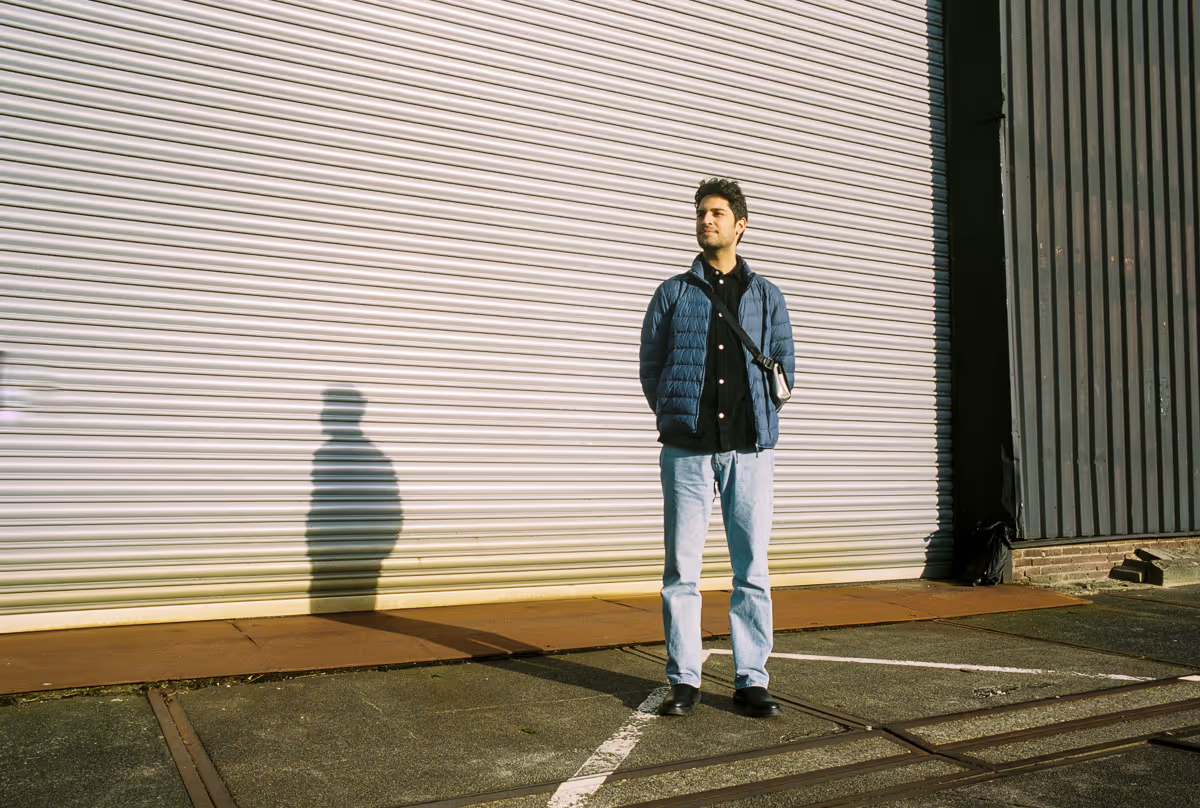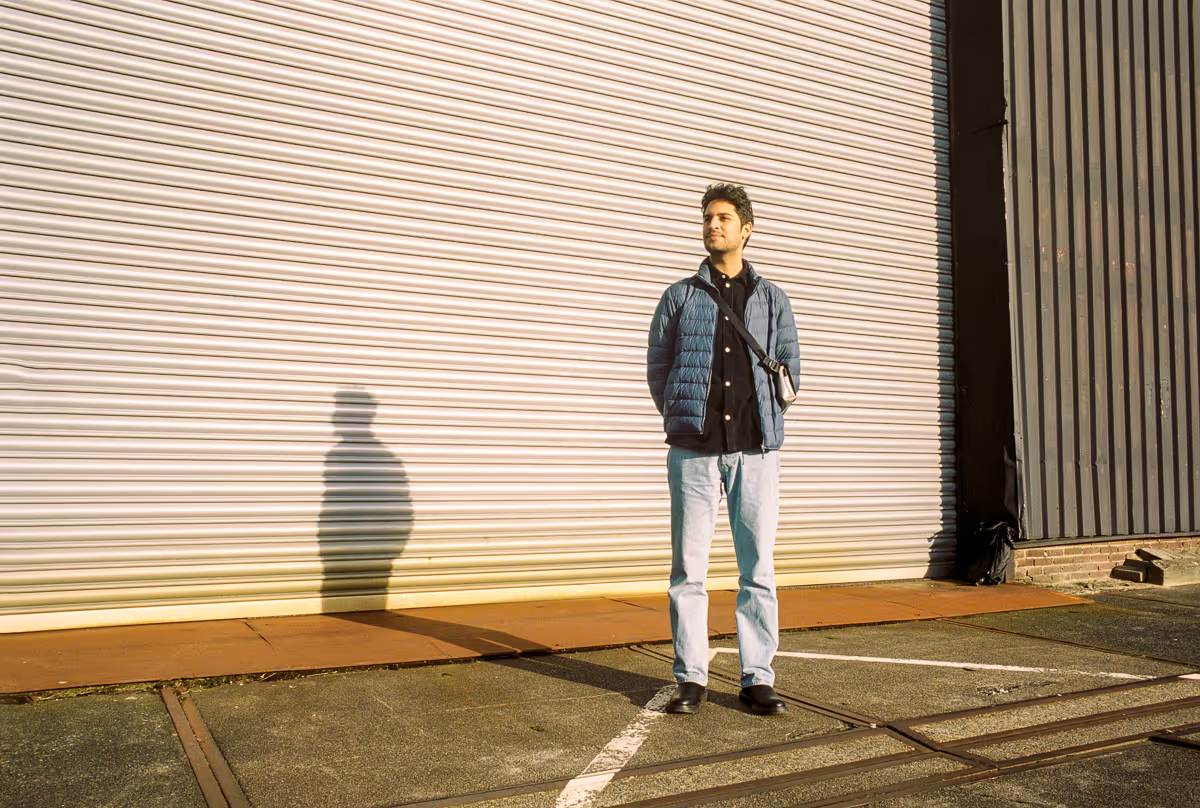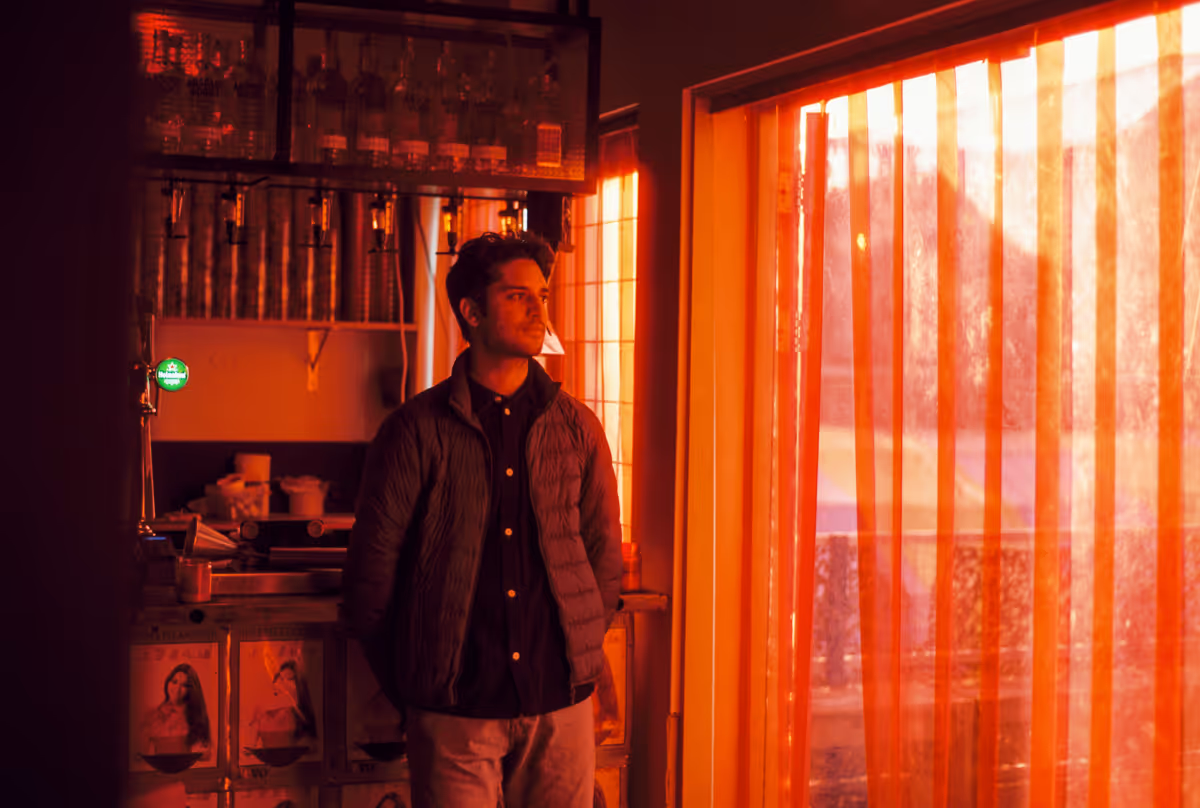





Text by Blurbs
Photo by Lukas Turcksin
Keytrade and Horst share DIY entrepreneurship as a common denominator. With ‘Their Way’ they inspire their shared philosophy through a content series. ‘Their Way’ offers the stories of DIY entrepreneurs at the forefront of art, architecture and music. We delve into the messy, yet inspiring and insightful process of entrepreneurship. We celebrate and feature compelling stories, challenging initiatives and examples of integrity from around the world.
On one of the first sunny Spring days in Brussels, we caught Ilyas Fdis right off the bus from Amsterdam for a relaxed and inspiring chat about his booking agency, Minor AM. Young in years but full of wisdom and fresh takes on the best and worst parts of the industry, he’s charting a new course for artists that challenge norms and demand a safer, healthier music community. His personal ethos seems to shine through the artists he has come to represent: Octo Octa, Mary Lake, Dee Diggs, and Russell E.L. Butler (among others) all call Minor AM home, and they’re unapologetically spreading a message of transparency and diversity in the scene. A counter-gatekeeping movement, if you will.
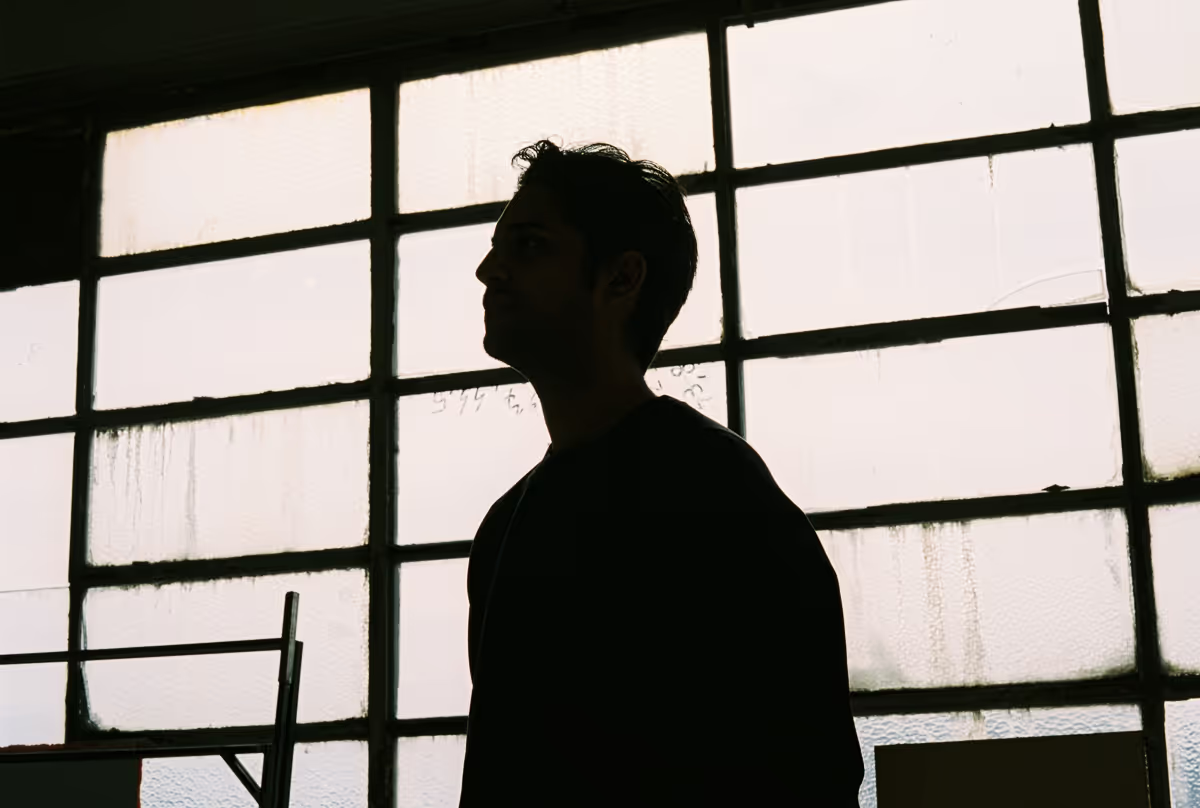
Horst: Hey Ilyas, thank you for joining us. Let's first have a little introduction of who you are, your history, and what led you to Amsterdam.
Ilyas: Thanks for having me. My name is Ilyas, I’m 26 years old and originally from Rotterdam. I moved to Amsterdam six, almost seven years ago, so it's been quite a while. My heritage is North African, and actually I'm a student in Public Policy as well. I founded Minor AM in 2019.
Horst: How did you get into the music business? Was it always a passion?
Ilyas: I didn't study it, it was just a passion. I was clubbing a lot at that time and it grew from there: the curiosity and seeing how people navigated the industry. It was very difficult to break into it because it’s such a closed industry. There isn’t a manual that says where to start. I had events and marketing internships when I moved to Amsterdam, which were not my thing. There was a lot of trial and error. I worked at a smaller agency just before I started Minor. You always need someone that will introduce you, and if you don't have that person, it's very hard.
Horst: That begs the question, have you been a DJ or do you aspire to be one?
Ilyas: No, I don't. I truly don't aspire to be a DJ! I know it’s a very weird answer. When I give it to people they’re always like, are you sure? Are you sure you don't want to be a DJ? I really don’t. It gives me a lot of anxiety thinking about it: being a public persona and people coming up to me. But I love music obviously. Another thing is patience: I don't have the patience to be a DJ.
Horst: It's a refreshing answer to meet people in the scene who are like, surprise! Totally not trying to be a DJ.
Ilyas: I just want to work and help change the scene.
{{images-1}}
Horst: What gave the idea to start a booking agency? Was it always a goal of yours?
Ilyas: No, it wasn't. I worked at a smaller booking agency at that time. And I just had a lot of ideas but there wasn’t the possibility to realize those within the agency. I had a lot of backlash from my boss all the time, so I quit that. Then I was desperately looking for a job, but no one wanted to hire me. I had a lot of conversations, and then they would turn me down. And at some point I stopped and thought, “What do I really want to do in this industry?” Being a booking agent, you can make a difference. You have a say in certain decisions, especially with clubs. Then Minor AM was born.
Horst: What was your biggest influence in starting the agency? It seems that you were generally unhappy with the industry dynamics you were experiencing.
Ilyas: Yes, I was very frustrated. I still have a bit of that frustration. I was 23 when I started the agency and still a baby, trying to adult. Then there was Discwoman – they weren’t a direct influence, but if Discwoman never happened, I would've never had the idea to start an agency. They definitely paved the way. I wanted something less focused on women that represents an intersectional approach to minorities. That was the idea behind it: to start something that wasn't there.
Horst: Thank you Discwoman! Can you tell us about the name Minor A…wait – it just clicked.
Ilyas: Just making the connection, yeah! It's very simple. I was just thinking about a name and I was like, what do I want this agency to represent? Minorities. I'll just use this. I found it dope. No one really has the click immediately.
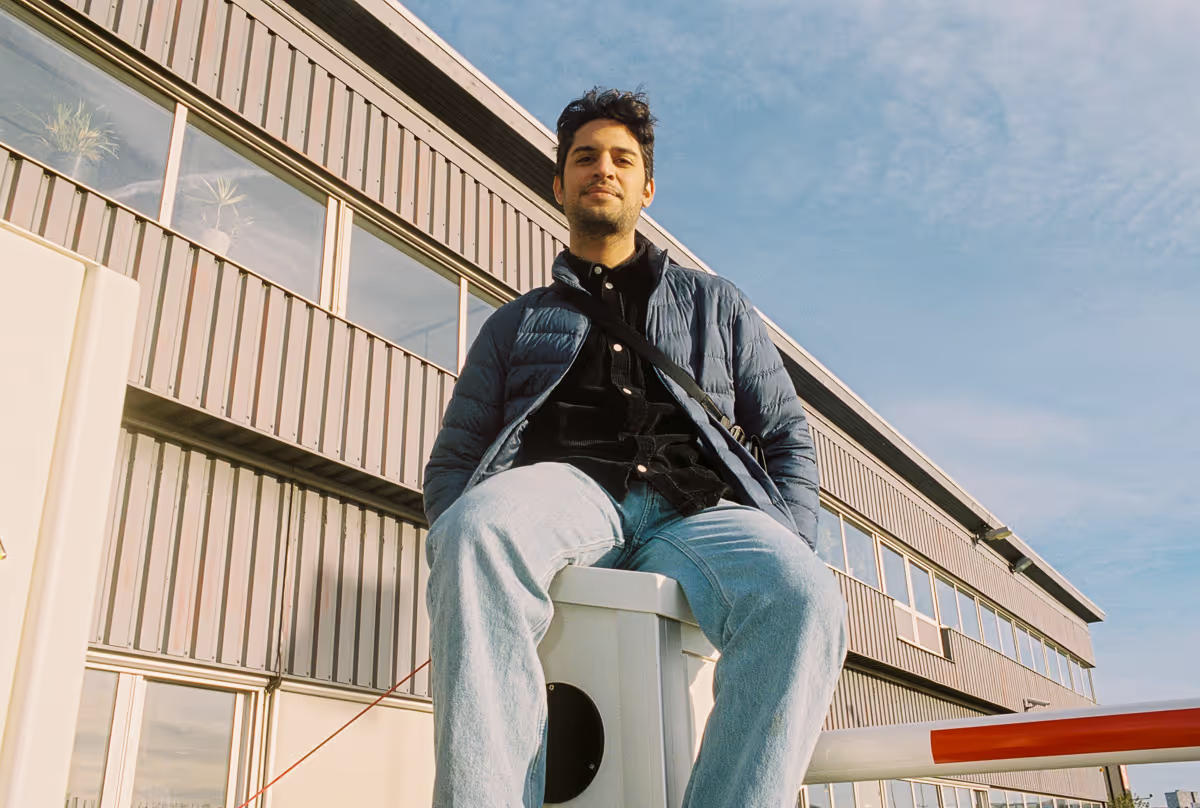
Horst: As the founder of the agency, what does your role entail?
Ilyas: It entailed everything up until recently. We now have someone that helps us, but that's very new. I generally think about long term goals for the artists, how to get there, and general strategy. I have a colleague who is taking over the administrative side of things.
I definitely feel like more than a booking agent with our artists. The lines are very blurry, which is sometimes a struggle. But it's also a nice part of it. Some artists on our roster have managers, which is cool because then it’s really clear what you have to do. Artists that are in their early phase of their careers are navigating so many decisions that will impact them, and they need guidance on that. Undoubtedly, everything that you do is very personal, you become a coach and friend.
Horst: As you said, you're still very young. How was it to gain this initial experience in your career, especially when many other agents are older. Do you have any mentors?
Ilyas: During the first period of Minor, I was very hesitant to ask my peers questions – I was just making mistakes and learning from those mistakes. I will never forget when one agent, Keira Sinclair, who ran Poly AM, reached out to me and said, “Hey, if you ever need help, let me know.” That was the nicest thing. She quit during the pandemic, which is very unfortunate, but I used to always call her and ask questions. Today I work with someone very closely. His name is Alex Giacometti and he's the in-house agent of T4T LUV NRG, and also the manager of Octo Octa and Eris Drew. He has so much experience and he grounds me so to speak. He represents some incredible artists like Kiernan Laveaux, Bored Lord, CCL and ADAB. In this scene, a good support system is essential. You need someone to bounce ideas off of.
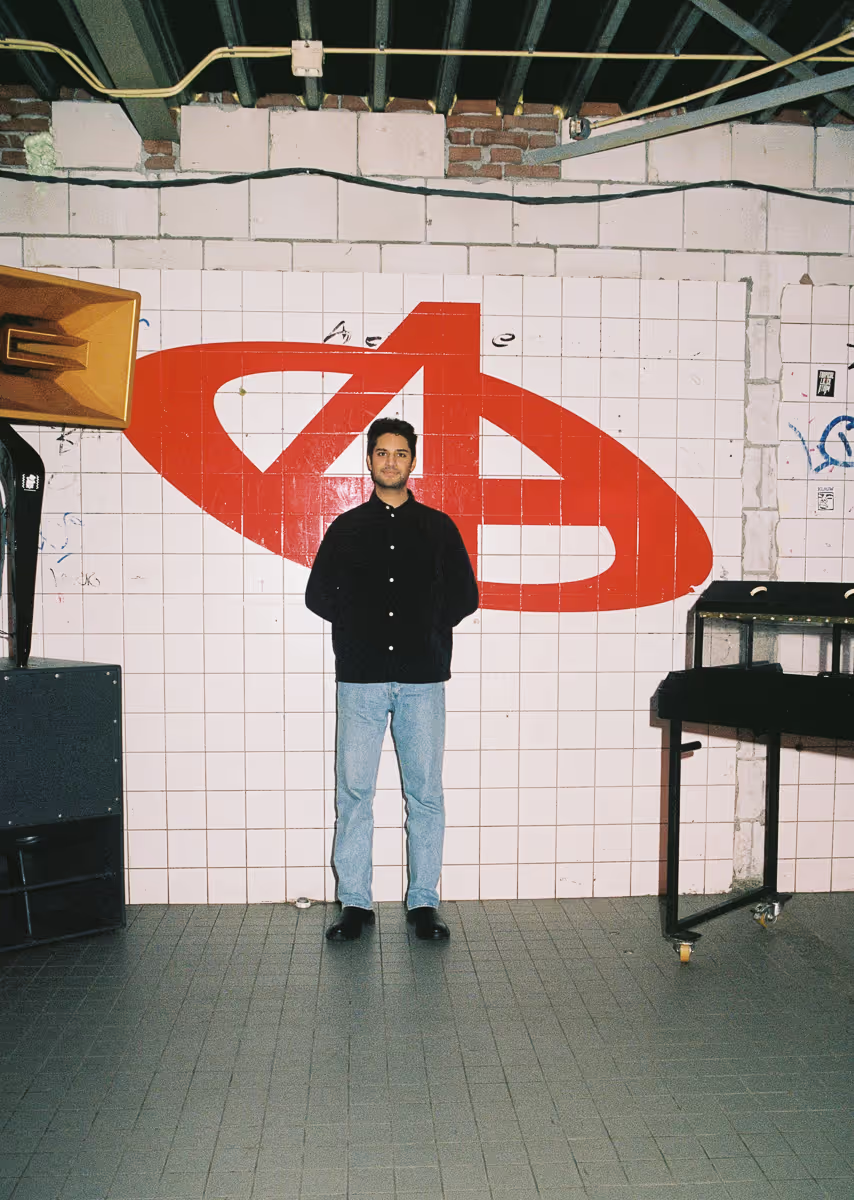
Horst: How do you choose artists to represent? Can you give us some specific stories of how you started working together?
Ilyas: There's not a straightforward approach to it. There's definitely some interesting stories. Then again for some artists on the roster, we just reached out through email, got onto a Zoom, and went from there. Others, for example with Suze Ijo, I've known her since I was a teen. We used to hang out and then somewhere along the way we lost touch. Eventually she started DJing, and I knew how much effort she put into it. So I reached out to her again, and we started working together. It was a full circle moment. Another funny story is Alison Swing. I met her in Panorama Bar a few years ago, and the rest is history.
Horst: What are some of your methods for discovering new talent?
Ilyas: I love to see the residents play when I go abroad. I don't really care for the headliners because you can see them everywhere. I like it when a city has residents that carry out a certain sound. The residents always bring it. That's the most exciting part of going out abroad. Generally I'm always looking for something authentic, not washed up. I don't want to listen to something hyped.
"Peak happiness is when I see a number of our artists hanging out together, at a show together, having a drink together, cheering each other on. That's the best part for me, just friends supporting each other."
Horst: Issues of equal representation, gender, race, and class are very important to you and the agency. How are you promoting this in your work?
Ilyas: I've been thinking a lot about this lately. This agency started from this point where guaranteed representation of minorities is the long term goal for us. We select our artists on it as well. You have to be a minority to be in the agency, in short. More accurately, you have to challenge the dominant culture. But our artists are so much more than that, so much more than an identity, so I haven’t been putting that out there as much anymore. We focus way more on artists that come from vulnerable communities, that have certain needs that are not being met by other agencies. We put way more emphasis on safety during a tour. We represent artists that could be harassed on site, many artists whose problems could start at the airport, like with an extra security check. Or when bouncers don't believe that they are there to DJ. All of these things we try to incorporate in our booking process. It means super specific riders and hammering on these details every single time. We always make sure in the contract that someone from the club or event team will be with them all the time. Things like that.
Horst: You grew very fast, even during Covid. You now have 10 artists under your care. Can you share more about how this evolved over the years since 2019?
Ilyas: I don't really have a target number of artists that I would like to represent. 10 is a lot and we have one agent at the moment. I would say we’re at a maximum until we expand our team. Representing a lot of artists is tricky, it doesn't really allow you to spend time on a certain artist and meet their needs. It’s growing really fast, almost too fast, but I’m grateful. We started almost a year before Covid, and then minority representation finally became a more mainstream subject. People have given it a lot more thought and are more positive towards the agency.
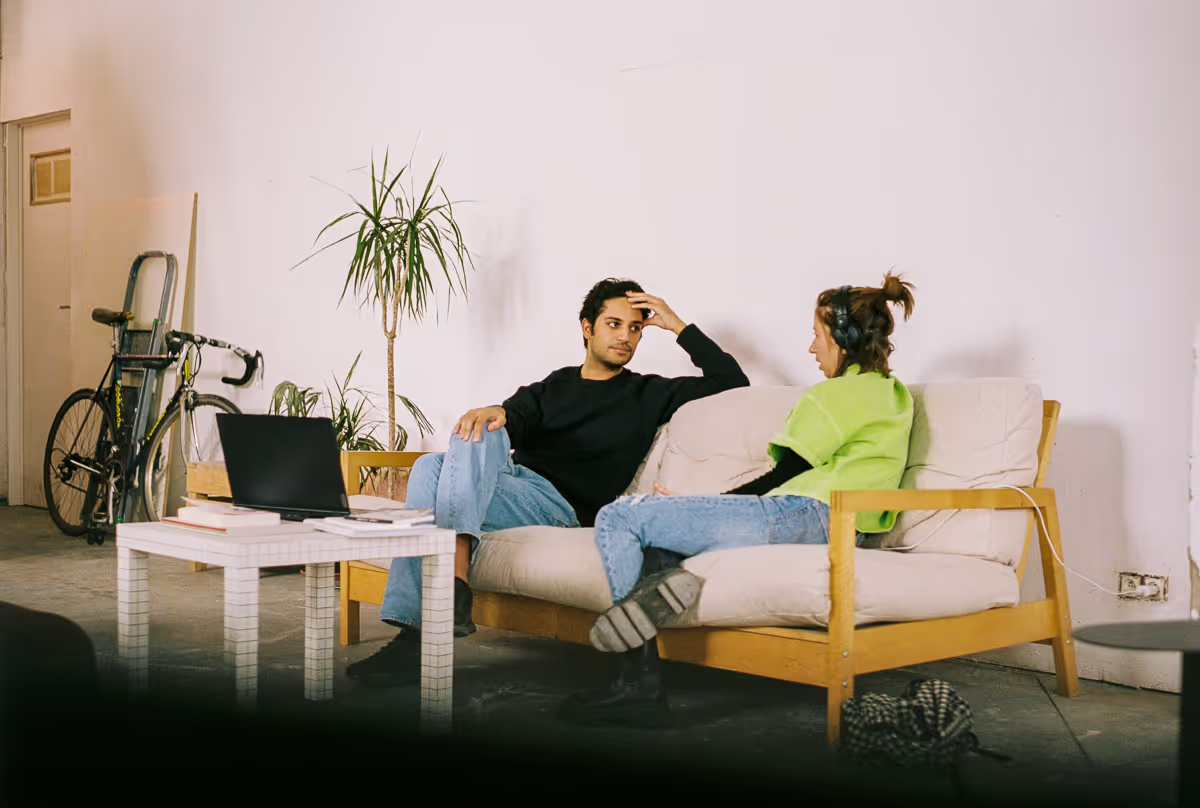
Horst: What has been the best part of the journey so far? The worst part
Ilyas: Generally I'm quite happy. Peak happiness is when I see a number of our artists hanging out together, at a show together, having a drink together, cheering each other on. That's the best part for me, just friends supporting each other.
The worst part has been finding a way to push for change without offending people. I should say it’s the hardest part, finding a balance in the dialogue. You sometimes have to give something of yourself to get something back in return. I struggle with that a lot. But actually the worst part is artists leaving. Artists won't stay with you forever, and it’s difficult. Everything is so personal. You develop friendships, it's almost as if you are in a relationship together. Sometimes artists feel like they have to move on quickly in order to feel like something is changing, that they’re making progress. Which is understandable, but of course it can be painful.
Horst: Tell us the one piece of advice you wish you had when you started?
Ilyas: Definitely – not getting caught up in other people’s business. That’s by far the best piece of advice I can come up with. Mind your own business! Comparison is the thief of joy. If you compare yourself to others and you're watching everyone's step, you're never going to be happy with what you're doing. Never. Just limit those interactions. Don’t be bummed out all the time because you might have a dip in your touring schedule. That’s such an unfortunate thing, because maybe playing out all the time and having a full schedule should not be your goal. Many artists don’t realize that it won’t make them very happy until they get there and experience it for themselves.
Horst: We're emerging from two years of lockdown conditions. Did this have any unexpected impacts on you or the agency?
Ilyas: It had a positive outcome. I found some other things that I'm really passionate about during the lockdown, which was really important to me. It's so easy to lose yourself in work, especially when you're running a company – it's your baby, and you're working 24/7. But it’s not sustainable. I studied a lot during this time. I've read books, I did all these things that I never had time for, and now I cling onto these things to escape music for a little while.
"No one likes to talk about finances, and no one wants their finances out there. I would like to urge bigger agencies and organizations to push for more pay transparency in the next few years."
Horst: What is the main priority or goal of Minor AM and how is it different from other agencies? How do you go about pushing for change in the scene?
Ilyas: I think Minor AM is different because we’re very honest to the artist that it’s not all about them, it’s partly transactional. They have a lot of instrumental value to us, and we do to them. We’re trying to pursue something together which doesn't center either me or them, it centers on others. That's very beautiful. It's also the reason that some of the artists on the roster chose for this agency. For us it’s about changing some of the dynamics and creating this counter-gatekeeping culture. I’m not going to pretend we do everything perfectly, but if we do any gatekeeping, it’s for artists that don't have an agent, or other minority artists. We need to resort to gatekeeping to ensure fair competition for everyone in this industry.
We focus on a lot of behind the scenes dialogues. I try not to resort to public things. Of course I have certain thoughts about certain subjects and certain decisions that we make as an agency. For example, our artists don't play in Israel for the time being, or in certain clubs, and those are political decisions. They are well thought-out decisions that we take with our artists. We're always open for conversation, and generally we are quite approachable in that sense. People appreciate that. Finally, I spend a lot of time thinking about pay for artists. It’s so difficult to approach this issue. It feels impossible for a small agency like us to make a difference. When we book a big(ger) artist somewhere, we sometimes resort to backdoor deals with other artists on the bill and give them a portion of the fee. These steps matter. No one likes to talk about finances, and no one wants their finances out there. I would like to urge bigger agencies and organizations to push for more pay transparency in the next few years.

Horst: You work with artists both in the US and EU. How do you think the scenes differ?
Ilyas: US artists are generally more serious, and the electronic music dialogue in the US is much more morally driven. They’ll say, “We're on a mission and the mission is political. We’re going to carry out this legacy of electronic music that started with Black artists in the US.” It’s beautiful. American artists have each other's backs, they always repost each other's mixes to lift each other up. With community care, they often fundraise for each other. I love that. Sometimes I miss some silliness though, but it’s a privilege to be silly. Europe is less DIY, and it’s been a big business for a long time. Maybe that makes it more individualistic.
Horst: What would you say is the role of artists and DJs in our society?
Ilyas: Good question. I would say that they can have a healing effect for certain communities. For example, when I look at Octo Octa and Eris Drew, the way they touch so many people is beautiful. When I go see Suze Ijó or Fafi Abdel Nour play out, and I notice a crew of black and middle eastern queer kids showing up to see them play. Nothing beats that feeling. However I dislike the centering of DJs as superstars. I generally tend to look for the opposite when I sign an artist. I look for someone that is doing their job and not really into that part of it. I know it's a cliché to be against the idolization of artists, but I am, even though you would think it's part of my job.
Horst: Do you have any other side projects going on? What are you studying?
Ilyas: Studying is a big side project. I’m on the board of this leftist political organization called Radicaal. We do a lot of reading, organizing, and protesting, and that’s been great. I'm studying public administration and law – I don't see myself working in music forever. Minor is not going to be around for the next 10 years, and I'm always honest about it. I have a lot of ambitions, and I want to do different things. I’m putting in all I have right now!
Horst: How would you describe the Amsterdam scene?
Ilyas: I've stayed in Amsterdam for a specific reason. Amsterdam has a lot of international exposure. The competition is less fierce in comparison with Berlin, for example. It's easier to push through as a DJ and generally the fees are higher for locals. If you are starting to DJ in Amsterdam, it's much easier to make a living out of it in a short time frame. Other than that night life here has a high production value. That’s great about Amsterdam.
Horst: What are you most looking forward to in the coming months?
Ilyas: I'm looking forward to everything smoothing out. I feel like everything has been in huge waves, clubs closing, then opening again, then closing… we’ve had a load of work in a very short time frame, and everything is rushed. I hope things will settle down.
Horst: What are some words of advice to someone who wants to work as a booker or start their own agency?
Ilyas: Start reaching out to people, ask for a coffee, ask them questions. Ask for help, and don’t be afraid of rejection. There's so much that you can learn from others. Be open to that.
